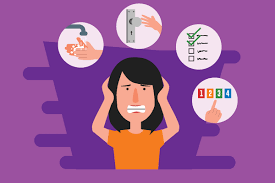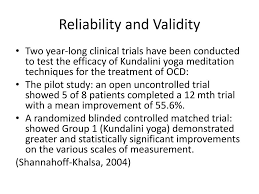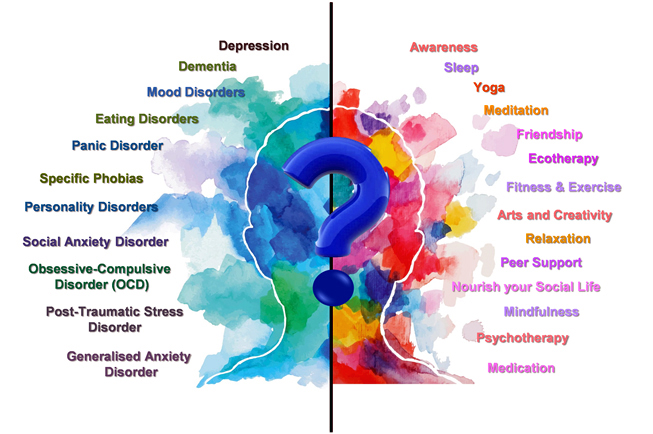There is a lot of discussion around whether or not yoga can be effective in treating OCD. This is a complex question to answer, as OCD is a complicated mental health condition. In this blog post, we will explore the question of yoga and OCD in depth. We will look at what OCD is, how it can be treated, and the role that yoga can play in treatment. We will also discuss some of the limitations of using yoga alone to treat OCD symptoms. Ultimately, we hope to provide readers with a better understanding of how yoga can be part of a larger treatment strategy for OCD.
Contents
Understanding OCD As a Mental Health Condition

Before we can answer the question of whether or not yoga can help treat OCD, it is important to understand what OCD is and how it can be a debilitating mental health condition.
OCD is short for Obsessive-compulsive Disorder. It is an anxiety disorder that is characterized by intrusive thoughts (obsessions) and repetitive behaviors (compulsions).
People with OCD often feel compelled to perform certain rituals or routines to ease their anxiety. These rituals can be time-consuming and interfere with daily life. In severe cases, OCD can be completely debilitating.
Arguing Whether Yoga Can Help Treat OCD or Not

There is no one answer to this question. Some people with OCD may find that yoga helps to ease their symptoms, while others may not find it helpful at all.
There is some evidence to suggest that yoga can help manage OCD symptoms. One study found that people who practiced yoga had a decrease in the severity of their OCD symptoms.
However, it is important to note that this study was small and cannot speak for larger represenations. Moreover, more research is needed to confirm the findings of this study. As this research is still preliminary.
Limitations of Yoga In Treating OCD
There are some limitations to using yoga to treat OCD.
- First, it is important to remember that yoga is not a cure. If you are struggling with OCD, you should seek professional help.
- Second, yoga may not be effective for everyone. Some people may find that their symptoms are not alleviated by yoga.
- Third, yoga is not always accessible. Not everyone has the time or ability to go to a yoga class.
- Finally, yoga can be time-consuming and may not be realistic for some people. If you have a busy lifestyle, it may be difficult to find time to practice yoga regularly.
Discussing Why Yoga Can Be Part of a Larger Strategy

OCD is a complex mental health condition that requires a multifaceted approach.
How Yoga Can Help Manage OCD Symptoms
Yoga can help manage OCD symptoms for a few reasons.
- First, yoga is a form of mindfulness. Mindfulness is the practice of being present in the moment and accepting things as they are. This can be helpful for people with OCD because it can help them to break the cycle of intrusive thoughts and repetitive behaviors.
- Second, yoga can help to reduce stress and anxiety. This is important because stress and anxiety can trigger OCD symptoms.
- Finally, yoga can help to improve sleep. This is important because people with OCD often have difficulty sleeping.
Can Yoga Complement Other Treatment Options
Yoga can help manage symptoms and may help reduce the severity of OCD. However, it is important to remember that yoga alone cannot treat OCD.
There are many effective treatment options for OCD, including therapy, medication, and surgery. Thus, Yoga can be part of a larger treatment strategy.
Suggesting Best Yoga Asanas And Pranayama For OCD
There are many different yoga asanas and pranayama that can help treat OCD. These include:
Asanas
Asanas are physical exercises that help to strengthen and tone the body. They can also help calm the mind.
- Tree Pose: The tree pose is a balancing pose that can help you focus and concentrate.
- Mountain Pose: Mountain pose is a grounding pose that can help you feel centered and calm.
- Warrior I Pose: Warrior I pose is a powerful pose that can help you build confidence and strength.
- Downward Facing Dog Pose: Downward facing dog pose is a calming pose that can help relieve stress and anxiety.
Pranayama
Pranayama is a type of breathing exercise that can help manage stress and anxiety, thus, helping calm the body and mind.
- Ujjayi: Ujjayi is a type of pranayama that involves a Victorious Breath.
- Kapalabhati: Kapalabhati is a type of pranayama that involves a Skull Shining Breath.
- Anuloma Viloma: Anuloma viloma is a type of pranayama that involves Alternate Nostril Breathing.
- Bhramari: Bhramari is a type of pranayama that involves a Humming Bee’s Breath.
Contraindications For Yoga
Some people should not do yoga, or should only do yoga with caution. These include people with:
- High blood pressure: People with high blood pressure should be cautious when doing yoga, as some poses can increase blood pressure.
- Heart conditions: People with heart conditions should be cautious when doing yoga, as some poses can increase heart rate.
- Glaucoma: People with glaucoma should be cautious when doing yoga, as some poses can increase intraocular pressure.
- Herniated discs: People with herniated discs should be cautious when doing yoga, as some poses can exacerbate the condition.
- Osteoporosis: People with osteoporosis should be cautious when doing yoga, as some poses can increase the risk of fractures.
Listing Effective Treatment Options To Treat OCD
If you are struggling with OCD, there are many effective treatment options available.
Therapies for OCD
Many different types of therapy can be effective in treating OCD. These include:
- Cognitive Behavioral Therapy (CBT): CBT is a type of therapy that focuses on changing negative thoughts and behaviors. It is an effective treatment for OCD.
- Exposure and Response Prevention (ERP): ERP is a type of therapy that involves exposure to the things that trigger your OCD and then learning to resist the urge to perform compulsions.
Medications for OCD
There are many different types of medications that can be effective in treating OCD. These include:
- Selective Serotonin Reuptake Inhibitors (SSRIs): SSRIs are a type of antidepressant that can be effective in treating OCD.
- Serotonin and Norepinephrine Reuptake Inhibitors (SNRIs): SNRIs are a type of antidepressant that can be effective in treating OCD.
- Tricyclic Antidepressants (TCAs): TCAs are a type of antidepressant that can be effective in treating OCD.
- Monoamine Oxidase Inhibitors (MAOIs): MAOIs are a type of antidepressant that can be effective in treating OCD.
Surgery Options for OCD
There are two types of surgery that can be effective in treating OCD:
- Deep Brain Stimulation (DBS): DBS is a type of surgery that involves the implantation of electrodes in the brain. These electrodes deliver electrical impulses to specific areas of the brain that are involved in OCD.
- Cingulotomy: Cingulotomy is a type of surgery that involves the destruction of the cingulate gyrus, which is a part of the brain that is involved in OCD.
How To Choose The Right Treatment Option
The best treatment for OCD will vary from person to person. It is important to speak with your doctor or therapist to develop a treatment plan that is right for you.
If you are considering adding yoga to your treatment plan, it is important to speak with your doctor or therapist first. They can help you develop a plan that is right for you.
How Mantra Care Can Help You
If you are struggling with OCD, Mantra Care can help. We offer a comprehensive treatment program that includes therapy, medication, and yoga. Our team of experts will work with you to develop a treatment plan that is right for you. Contact us today to learn more about our program and how we can help you overcome OCD.
Conclusion
Yoga can be part of a larger treatment strategy for OCD. It can help manage symptoms and may help reduce the severity of OCD. However, it is important to remember that yoga is not a cure. If you are struggling with OCD, you should seek professional help. There are many effective treatment options for OCD, including therapy, medication, and surgery.
If you are looking for affordable Online OCD Counseling MantraCare can help: Book a trial OCD therapy session


